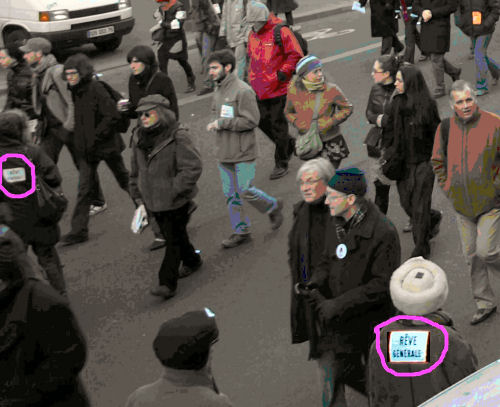
(Photograph, "Rêve Générale" by Francis Ronsin, taken during the demonstration of 29 January in Paris.)
France is currently going through an acute social and political crisis. And an economic crisis too, it is said, like everywhere else. For me, however, this is only the consequence of the first two kinds of crisis.
Towards a Modern France
Until the end of the 20th century the French still enjoyed public services of a standard equaled almost nowhere else in the world. Education: free government school from the age of 3 years right up to baccalaureat [university entrance examinations]; free and compulsory from 6 to 16 years of age. Almost free university courses. A health system which guaranteed access to care: public heath insurance, hospitals and pharmacies for even the poorest people. The trains ran fast (TGV) and arrived in one piece on time. Mail was delivered in 24 hours no matter where it came from or where it went. The postman came by my place up to three times a day (in Paris). Many unemployed people suffered – especially the youngest ones – as did people with salaries that were too low even then – but they were still protected from absolute poverty.
Revolting inequalities and injustices persisted and many of us protested. At the same time, however, it seemed natural to benefit from basic social welfare. Yes, it was beginning to erode, but it was not fundamentally in question.
France had always been careful to preserve independence with regard to the United States. For this reason the impact of the US world capitalism project and ultraliberal ideology wave was delayed here. The progress of ultraliberal ideas accelerated with the collapse of the Soviet Union and with the decline of the French Communist Party which followed. Up until 1980 the Communist party had received more than 20% of votes; in the last elections it only received 3%. Rid of this ally/competitor, the other big political party of the Left – the Socialist Party – followed the example of European Social Democrats and labour parties by coming to believe that freedom and prosperity of private enterprise were the basis of general well-being and that the only real form of democracy was the one defended – which meant imposed – by the Western block under the natural direction of the United States.
Their mainstream media being either government controlled, or having fallen largely into the hands of the big finance groups, the French were subjected to intensive propaganda. This propaganda caricatured the country as divided between creators of wealth: financiers, industrialists, heads of enterprise, dynamic executives … and “dependents”, “protected”, “parasites”, who took advantage of the system and created an unbearable load on the nation’s useful people. To enable French enterprise to become competitive at the highest world level a vast construction-site of radical reforms was indispensable.
Public services dismantled
The people responsible for France’s anaemia having been clearly identified : public servants, lazy people, too numerous and too well paid, unemployed people, more interested in accumulating benefits and payments than in looking for work, people with real and imaginary illnesses, carelessly overspending on treatment reimbursed by the state, old people, of which the proportion relative to the total population constantly increases because of demography, whose pensions are too heavy a burden now and will be an impossible one in the future, and illegal immigrants … Their evil deeds had to be stopped!
Since the President of the Republic, Jaques Chirac, was deemed not capable of urgently taking the necessary drastic measures, the Right found a replacement for him, who would hit quickly and hard. In 2007 Nicolas Sarkosy was elected, having promised to bring the ruinous social policies to an end. Effectively, he announced and immediately put to work, two series of ‘reforms’ the Right wanted, but which his predecessors had never dared to apply with such vigor.
A ‘package’ of fiscal measures allowed companies and the richest people to significantly reduce their taxes. In the same spirit, a number of high salaries – including his own – were strongly increased.
Simultaneously, other ‘reforms’ aimed to reduce the budget deficit and growth in public debt by going into battle against the perpetrators of the above-mentioned ‘abuses’.
Since laws protected public servants from being sacked, only one new public servant would be employed for every two that retired. Hospitals were already too under-staffed to function properly. A number will close to accommodate the programmed reduction in public servant numbers. Medical expenses are less and less well-reimbursed by [public] medical insurance. The number of years of saving required to qualify for full retirement benefits regularly goes up, just when enterprises want to get rid of workers more than fifty years old. The future for tomorrow’s retirees is very dark. The whole school system, from kindergarten to university, is being reorganized to adapt to a reduction in the number of teachers. A series of other decisions go in the same direction, in the direction of Margaret Thatcher or George Bush-type politics.
Is this leading to a major confrontation ?
The Right and most of the mainstream media applauded the president’s acts as he undertook a class war without hesitation or scrupule, indispensable for turning France into a modern nation. The political opposition, paralysed by internal quarrels of a Socialist Party widely affected by liberalist ideas itself, was incapable of proposing a radically different direction. Meanwhile, the most affected sectors protested, to the point of going on strike and demonstrating (public servants, high school students…) but always in an isolated manner. This changed after the global financial crisis and – perhaps – with the election of Obama.
Reacting to the global crisis, the government, which had claimed to be constrained to considerably reduce the social advantages and public services the French benefited from, immediately found billions of Euros to give or to lend to banks and to industrial enterprises, especially in the automobile sector. These same sectors stated themselves obliged to make many of their workers partly or fully redundant, all the while continuing to make considerable profits and to pay large sums out to their shareholders and directors. Anger and anxiety about the future spread widely, permitting the unions – united for once – to initiate a vast protest movement, culminating, the first time, on 29 January with a general strike and big demonstrations in all big cities (2.5 million demonstrators, including 300,000 in Paris.)
Forced to react, Nicolas Sarkosy appeared on three television stations to say that he understood how anxious the French were and would take this into account. He refused, however, to change his politics, despite the need to do so today, to combat the crisis, and tomorrow, to help re-launch the economy. His politics are those that the United States (his model) massively condemned at the last elections.
New demonstrations on the 19th of March were attended by even greater numbers.
Since then numerous universities have gone on strike. Guadaloupe and Martinique have also gone on general and indefinite strike.
In the face of a president whose only response to criticism is contemptuous and insulting, some people have begun to dream of a movement like the 1968 clashes. This is what the many demonstrators of 29 January 2009 were expressing with stickers on their jackets bearing words in the spirit of 1968: “Grève Générale” -- General Strike -- translated into “Rêve Générale” --General Dream.
The unions continue to follow due process and negotiate, they have scheduled their next demonstration of strength for the first of May – a symbolic day - but also a holiday. In the mean time, workers, condemned to lose their jobs, are developing more radical battle strategies: notably the detention in their workplaces of upper echelon executives to make them more respectful of workers’ rights. At the same time, some people are even making another historic comparison - with 1789 – the beginning of the great French Revolution, which swept away an equally powerful and contemptuous aristocracy, and established a Republic styled on democracy and equality.
(Translated by Sheila Newman)
Francis Ronsin was Professor, Department of Contemporary History, at the Université de Bourgogne (Dijon). He has published several books and numerous articles that focus on the relationship between political struggles and private life: La Grève des ventres - Propagande néo-malthusienne et baisse de la natalité en France 19ème-20ème siècles (Aubier, Paris, 1980); Le Contrat sentimental - Débats sur le mariage, l'amour, le divorce, de l'Ancien Régime à la Restauration (Aubier, Paris, 1990) ; Les Divorciaires - Affrontements politiques et conceptions du mariage dans la France du XIXème siècle. (Aubier, Paris, 1992); Le Sexe apprivoisé -Jeanne Humbert et la lutte pour le contrôle des naissances (La Découverte, Paris, 1990) ; and La population de la France de 1789 à nos jours. Données démographiques et affrontements idéologiques (Le Seuil, Paris, 1997); La Guerre et l’oseille (Syllepse, Paris, 2003). He is also the principal organizer of the international research seminar Socialism and Sexuality.
Rights of partial or full reproduction of this article are forbidden without permission from Francis Ronsin.
 After John Howard followed up on the Kennett-led destruction of state awards, with his Corporations and Work Choices legislation,[1] the floodgates were opened for mass import of cheap labour. Before that, it simply did not pay to import cheap labour to Australia, because it was too hard for employers to escape the enforcement of industry awards at State, and, to a lesser extent, Federal level. It was for this reason that Australia had, 'til then, escaped the widespread scourg
After John Howard followed up on the Kennett-led destruction of state awards, with his Corporations and Work Choices legislation,[1] the floodgates were opened for mass import of cheap labour. Before that, it simply did not pay to import cheap labour to Australia, because it was too hard for employers to escape the enforcement of industry awards at State, and, to a lesser extent, Federal level. It was for this reason that Australia had, 'til then, escaped the widespread scourg
 Crew aboard a ship at a BHP terminal in Queensland claim they are being starved and underpaid, in yet another instance of the coal giant’s veil of secrecy over its operations in Australian waters. A seafarer aboard an 80,000-tonne bulk carrier, the Villa Deste, contacted the International Transport Workers’ Federation (ITF) pleading for help (email below). The starving crew claims to have no food and no onboard wages, and being fed on a $4 food budget per day.
Crew aboard a ship at a BHP terminal in Queensland claim they are being starved and underpaid, in yet another instance of the coal giant’s veil of secrecy over its operations in Australian waters. A seafarer aboard an 80,000-tonne bulk carrier, the Villa Deste, contacted the International Transport Workers’ Federation (ITF) pleading for help (email below). The starving crew claims to have no food and no onboard wages, and being fed on a $4 food budget per day. The last Australian seafarers to carry iron ore for BHP and BlueScope — work that was undertaken for more than a century — will return home tomorrow after completing their final voyage to Dandong, China. “Scott Morrison should front up to Sydney Airport, meet these workers, and tell them why his government has rubber-stamped BHP and BlueScope replacing them with exploited foreign seafarers who are paid as little as $2 an hour.” (MUA Secretary.)
The last Australian seafarers to carry iron ore for BHP and BlueScope — work that was undertaken for more than a century — will return home tomorrow after completing their final voyage to Dandong, China. “Scott Morrison should front up to Sydney Airport, meet these workers, and tell them why his government has rubber-stamped BHP and BlueScope replacing them with exploited foreign seafarers who are paid as little as $2 an hour.” (MUA Secretary.)
Recent comments